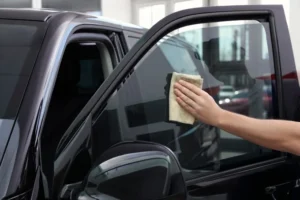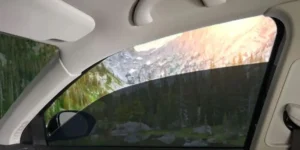Exposure to ultraviolet (UV) rays isn’t just a concern when you’re at the beach or outdoors—it’s also a significant risk while driving. Prolonged exposure to sunlight can harm your skin and damage your vehicle’s interior. Car window tinting is a practical solution that offers comprehensive UV protection, ensuring both your health and your car remain in optimal condition. In this article, we explore how window tinting shields you and your vehicle from the harmful effects of UV rays.
Understanding UV Rays and Their Effects
What Are UV Rays?
UV rays are a form of electromagnetic radiation emitted by the sun. They are classified into two main types: UVA and UVB. UVA rays penetrate deep into the skin, causing premature aging and increasing the risk of skin cancer, while UVB rays are primarily responsible for sunburn. Both types can be harmful when you’re exposed over extended periods, even while driving.
Health Risks of UV Exposure
Exposure to UV rays can lead to various health issues, including skin cancer, sunburn, and premature aging. Even your eyes are at risk, with prolonged exposure potentially causing cataracts and other vision problems. Car windows provide some protection, but without proper tinting, a significant amount of UV rays can still reach you.
Impact of UV Rays on Vehicles
UV rays don’t just affect humans—they can also wreak havoc on your car’s interior. Constant exposure to sunlight causes upholstery to fade, dashboards to crack, and plastic components to become brittle. Over time, these damages diminish your vehicle’s aesthetics and resale value.
How Car Window Tinting Blocks UV Rays
Technology Behind Window Tinting
Modern window tints are equipped with advanced UV-blocking technology. These films are designed to filter out up to 99% of harmful UV rays, providing an effective barrier between you and the sun. The tint’s effectiveness depends on the type and quality of the material used.
Percentage of UV Protection
Car window tints vary in their UV-blocking capabilities. Premium options like ceramic or hybrid tints provide nearly complete protection, making them an excellent investment for your health and vehicle. Lower-grade tints may offer basic protection but aren’t as effective against intense sunlight.
Types of Window Tints for Maximum Protection
There are several types of window tints available, each with unique benefits:
- Dyed Tints: Affordable but limited in UV protection.
- Metallic Tints: Provide better UV protection and heat rejection.
- Ceramic Tints: The top-tier option, offering superior UV blocking and heat resistance.
Choose a tint based on your needs and budget for optimal results.
Benefits of UV Protection for Your Skin
Preventing Skin Cancer and Premature Aging
One of the most significant advantages of car window tinting is its ability to reduce the risk of skin cancer. By blocking up to 99% of UV rays, window tinting acts as an invisible sunscreen for your skin. This protection also helps prevent premature aging caused by prolonged sun exposure, such as wrinkles, dark spots, and loss of skin elasticity.
Shielding Your Eyes From Harm
Glare from the sun is not only uncomfortable but can also lead to eye strain and long-term damage. UV exposure while driving can increase your risk of developing cataracts and other eye conditions. Tinted windows reduce glare and block harmful rays, providing much-needed relief and protection for your eyes.
Benefits of UV Protection for Your Vehicle
Preserving Interior Aesthetics
Without UV protection, your vehicle’s interior can fade, crack, and lose its original appeal. Upholstery materials such as leather, vinyl, and fabric are particularly susceptible to sun damage. Car window tinting minimizes these effects, keeping your car’s interior looking newer for longer.
Enhancing Vehicle Longevity
UV rays can degrade the materials inside your car, leading to brittle plastics, weakened fabrics, and fading dashboards. Over time, this damage affects the overall lifespan of your vehicle. By investing in quality window tinting, you can extend the life of your car’s interior components and maintain its value.
Legal and Practical Considerations
Legal Limits on Window Tint Darkness
Before getting your windows tinted, it’s essential to understand the legal limits in your area. Each state or country has regulations governing how dark or reflective your window tint can be. In California, for example, the law specifies that front side windows must allow at least 70% of light to pass through, while rear windows can have darker tints.
Professional Installation vs. DIY
While DIY window tinting kits are widely available, professional installation ensures optimal results. Experienced technicians, like those at Cali Auto Glass & Tint, use high-quality materials and precise techniques to deliver a flawless finish. San Diego Window Tinting Professional installation also comes with warranties, giving you peace of mind and long-lasting performance.
Conclusion
Car window tinting is more than just a style upgrade—it’s a practical investment in your health and vehicle. By blocking harmful UV rays, window tinting safeguards your skin from damage, prevents premature aging, and reduces the risk of skin cancer. For your car, it preserves the interior’s aesthetics, prevents material degradation, and extends overall longevity. To ensure maximum protection and compliance with local laws, trust professionals like Cali Auto Glass & Tint to provide high-quality, expertly installed window tints. Contact us today for a free consultation and start enjoying the benefits of UV protection on the road!
Frequently Asked Questions
1. How much UV protection does window tinting provide?
Most premium window tints block up to 99% of harmful UV rays, offering excellent protection for your skin and vehicle.
2. Can window tinting prevent skin cancer?
While window tinting cannot eliminate the risk entirely, it significantly reduces UV exposure, lowering the chances of developing skin-related conditions like cancer.
3. Is car window tinting legal in all states?
Yes, but each state has specific regulations regarding the allowable tint level. Be sure to check the laws in your area or consult with a professional installer.
4. How long does professionally installed window tint last?
High-quality window tints installed by professionals like Cali Auto Glass & Tint can last 5 to 10 years or longer, depending on the material and care.
5. Can window tinting help with heat reduction in the car?
Yes, many window tints, especially ceramic and hybrid types, provide excellent heat rejection, making your car more comfortable and energy-efficient.





